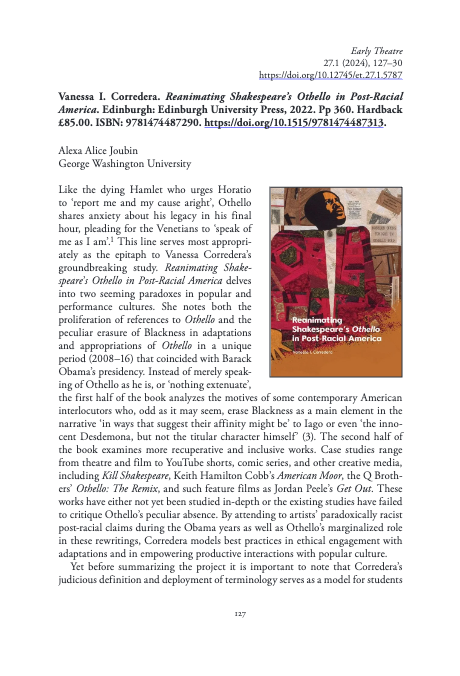Reanimating Shakespeare’s Othello in Post-Racial America, reviewed by Alexa Alice Joubin
Early Theatre 27.1 (2024): 127-130 ::: DOI: 10.12745/et.27.1.5787
Vanessa I. Corredera’s book delves into two seeming paradoxes in popular and performance cultures: the proliferation of references to Othello and the peculiar erasure of Blackness in adaptations. This occurred between 2008 and 2016, which coincided with Barack Obama’s presidency.
The first half of the book analyzes the motives of some contemporary American interlocutors who, odd as it may seem, erase Blackness as a main element in the narrative ‘in ways that suggest their affinity might be’ to Iago or even ‘the innocent Desdemona, but not the titular character himself’ (3).
The second half of the book examines more recuperative and inclusive works. Case studies range from theatre and film to YouTube shorts, comic series, and other creative media, including Kill Shakespeare, Keith Hamilton Cobb’s American Moor, the Q Brothers’ Othello: The Remix, and such feature films as Jordan Peele’s Get Out.
These works have either not yet been studied in-depth or the existing studies have failed to critique Othello’s peculiar absence. By attending to artists’ paradoxically racist post-racial claims during the Obama years as well as Othello’s marginalized role in these rewritings, Corredera models best practices in ethical engagement with adaptations and in empowering productive interactions with popular culture.
As much as the book critiques the hypocrisy of the Shakespeare industry, it also encourages artistic investment in antiracist work in post-post-racial America. Instead of attempting to speak of Othello as he is perceived in the play we should speak out against trans-historical racial tensions so as to reanimate both Othello and our collective future.
